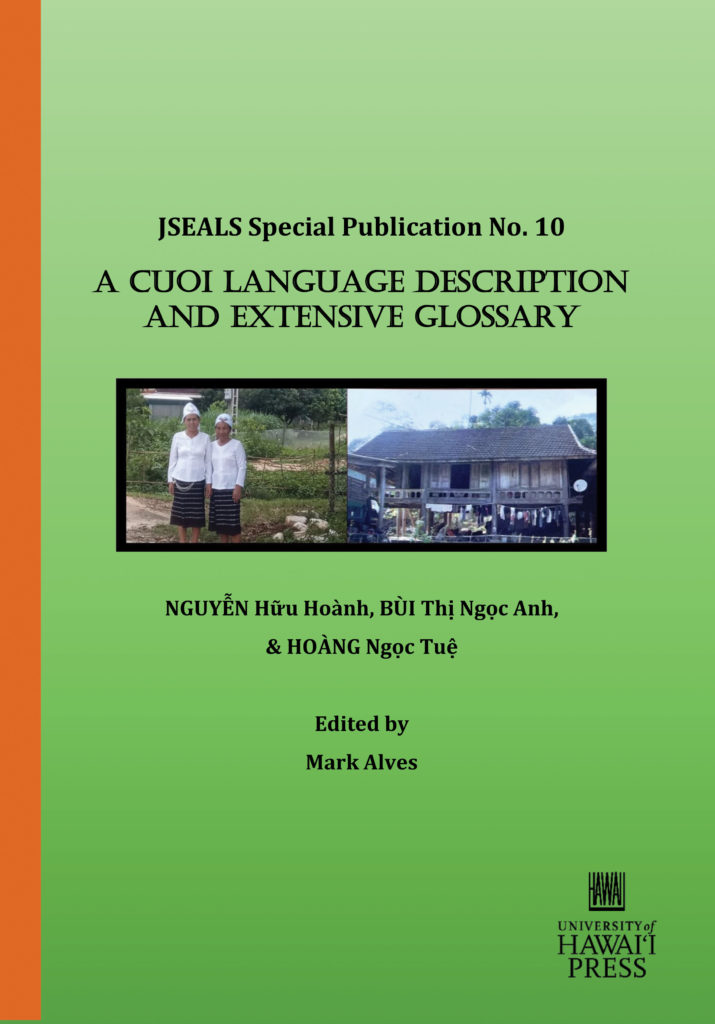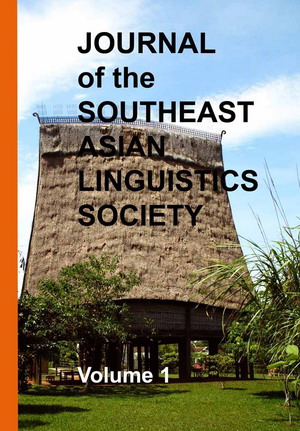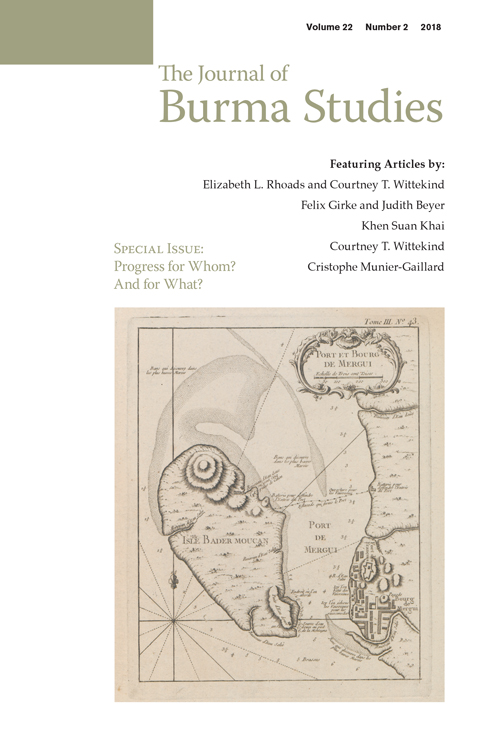
The newest Journal of the Southeast Asian Linguistics Society (JSEALS) Special Publication recently launched is titled “A Cuoi Language Description and Extensive Glossary.” UH Press spoke to Editor-in-Chief, Mark J. Alves about this new special issue.
Alves took over as JSEALS head editor in 2015 from Paul Sidwell, who ran it from its first publication in 2009. Alves was the co-editor for the 2022 JSEALS Special Publication “Vietnamese Linguistics: State of the Field,” in which he also contributed an article “Lexical Evidence of the Vietic Household Before and After Language contact with Sinitic” and a co-authored paper with James Kirby “Exploring Statistical Regularities in the Syllable Canon of Sino-Vietnamese Loanmorph Phonology”. He also recently published “The Ðông Sơn Speech Community: Evidence for Vietic” in the interdisciplinary journal Crossroads and “The Vietic languages: a phylogenetic analysis” (co-authored with Paul Sidwell), both in 2021.
University of Hawai‘i Press: Can you tell our readers some of the research, impacts, or projects you have been involved with outside of JSEALS that have enhanced your work with the journal?
Mark J. Alves: In working with the International Conference of Austroasiatic Linguistics (ICAAL) group, I contributed two chapters (one of my own and one co-authored chapter) to “Austroasiatic Syntax in Areal and Diachronic Perspective” (ed. by Mathias Jenny, Paul Sidwell, and Mark Alves) in 2020 and a chapter on the Pacoh language in “The Handbook of Austroasiatic Languages” (ed. by Mathias Jenny and Paul Sidwell) in 2014. For the World Loanword Database (WOLD) through the Max Planck Institute (MPI), I contributed Vietnamese data for the database and the chapter on loanwords in Vietnamese in the resulting book “Loanwords in the World’s Languages: A Comparative Handbook” (2009, ed. by Martin Haspelmath & Uri Tadmor).
UHP: What are some of the challenges you have faced during the pandemic, and have those continued to be an issue with the creation of articles and research now?
MJA: Due to the Covid-19 pandemic, I have not travelled to Asia since 2019, but I have maintained academic activity through the internet. I have participated in more conferences and have given more invited presentations in the last few years (e.g., 8 presentations in 2022) than I would have if only in-person presentations were the standard. However, I think the limitations on linguistic fieldwork is showing itself in reduced numbers of papers submitted to JSEALS on recently collected data in the field. Plenty of my colleagues are bemoaning the lost time from what they could have done had the pandemic not created so many challenges in travelling to the field. Time will tell how this situation will resolve itself.
UHP: JSEALS recently introduced a new Special Issue, “A Cuoi Language Description and Extensive Glossary.” How did this come about? Why did you devote an entire issue to this topic?
MJA: I have been in contact with Vietnamese fieldwork linguists for many years, and when I found that Professor Nguyen Huu Hoanh was interested in publishing his extensive data and description of the Cuoi language, I was extremely pleased. The Cuoi language deserved a JSEALS Special Publication because there had never been a complete published description of the language nor such a large amount of lexical data: over 3,000 words in two dialects, along with Vietnamese translations.
UHP: Why was it important to publish “A Cuoi Language Description and Extensive Glossary” now?
MA: In the Ethnologue, Cuoi has an endangerment status of “shifting”, meaning that there is decreasing amount of usage of Cuoi among younger speakers. Language maintenance among such minority language groups is difficult. Whether or not the Cuoi language can survive in future generations, at the very least, it has been documented and the data shared in publication.
UHP: How do you hope that readers will utilize this special issue in their own work?
MJA: The ways that this data could be used are (a) comparing the language data with neighboring languages in the region for a broader understanding of language typology in the region, (b) exploring historical linguistic questions of the history of the Vietnamese language, and/or (c) building on the linguistic description and lexicon to continue to work with the Cuoi people, whether for linguistic or anthropological queries. I hope that this publication encourages other linguists to devote time to fieldwork of this depth among minority languages in Vietnam and Southeast Asia.
UHP: Is there anything else you would like to add?
MJA: Linguistic researchers in the Greater Southeast Asian region are strongly encouraged to submit their work to JSEALS, whether full double-blind-reviewed research articles, “Data / Notes / Review” papers, or full JSEALS Special Publications. JSEALS has played an important role in publishing of Southeast Asian linguistics since changes of Open-Access Asia-Pacific Linguistics publisher and of loss of the Mon-Khmer Studies journal. Since 2009, JSEALS has published about 190 journal articles, and in the 10 JSEALS Special Publications, several dozen more articles have been published by an international range of scholars. Clearly, JSEALS contributes to Southeast Asian linguistic research, and we need submitted works to continue to such positive progress.

CALL FOR SUBMISSIONS:
The Journal of the Southeast Asian Linguistics Society accepts submissions written in English that deal with general linguistic issues which further the lively debate that characterizes the annual SEALS conferences. Devoted to a region of extraordinary linguistic diversity, the journal features papers on the languages of Southeast Asia, including Austroasiatic, Austronesian, Hmong-Mien, Tibeto-Burman, and Tai-Kadai.
Topics may include descriptive, theoretical, or historical linguistics, dialectology, sociolinguistics, and anthropological linguistics, among other areas of linguistics of languages of Southeast Asia. JSEALS also admits data papers, reports, and notes, subject to an internal review process.
Although we normally expect that JSEALS articles will have been presented and discussed at the SEALS conference, submission is open to all, regardless of participation in SEALS meetings. Each original article undergoes double-blind review by at least two scholars, usually a member of the Advisory Board and one or more independent referees.
JSEALS publishes fully open access content, which means that all articles are available on the internet to all users immediately upon publication. Non-commercial use and distribution in any medium is permitted, provided the author and the journal are properly credited. Authors retain copyright of their material. The journal does not charge Article Processing Fees.





